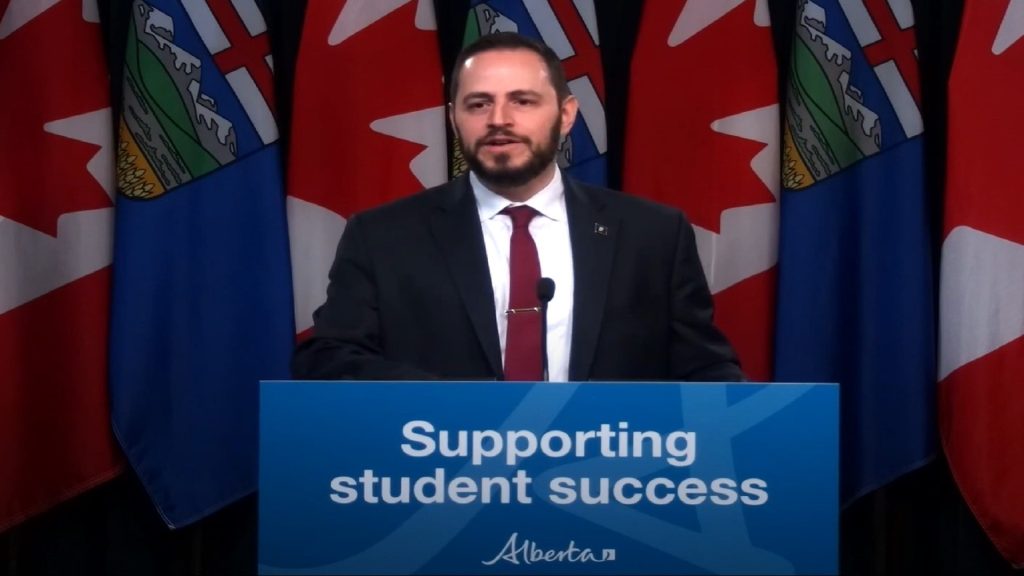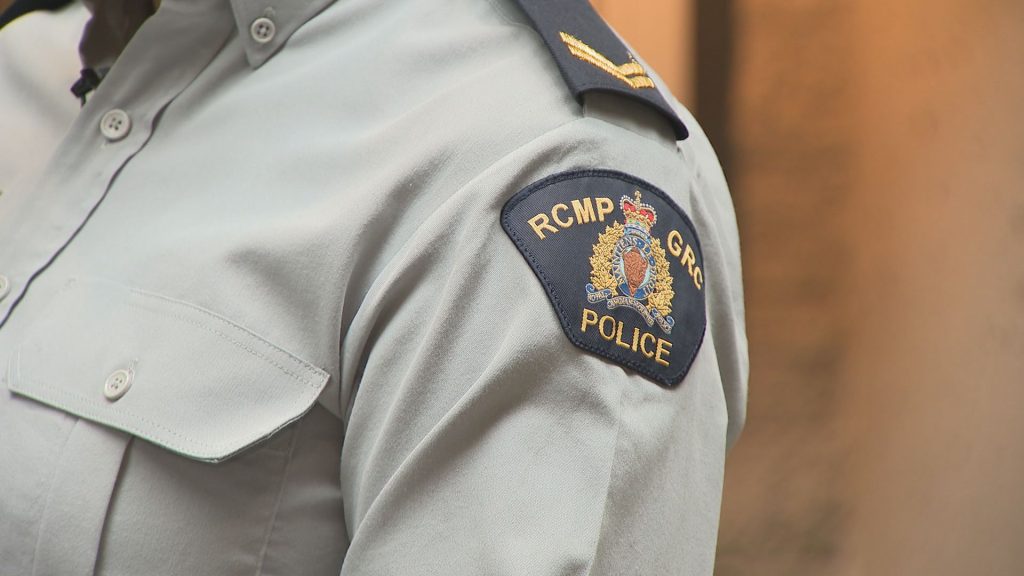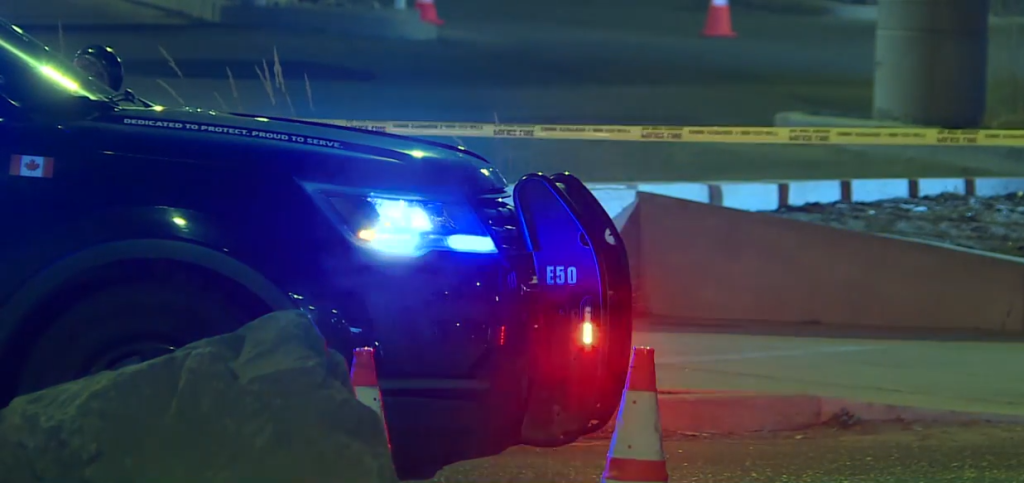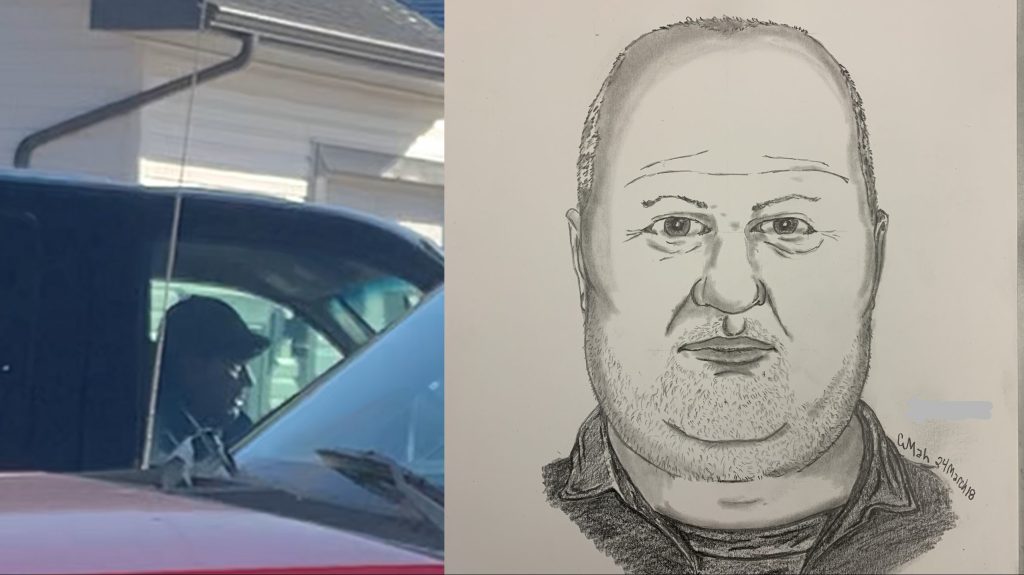Alberta government proposes provincial police force, potential end of RCMP and federal help
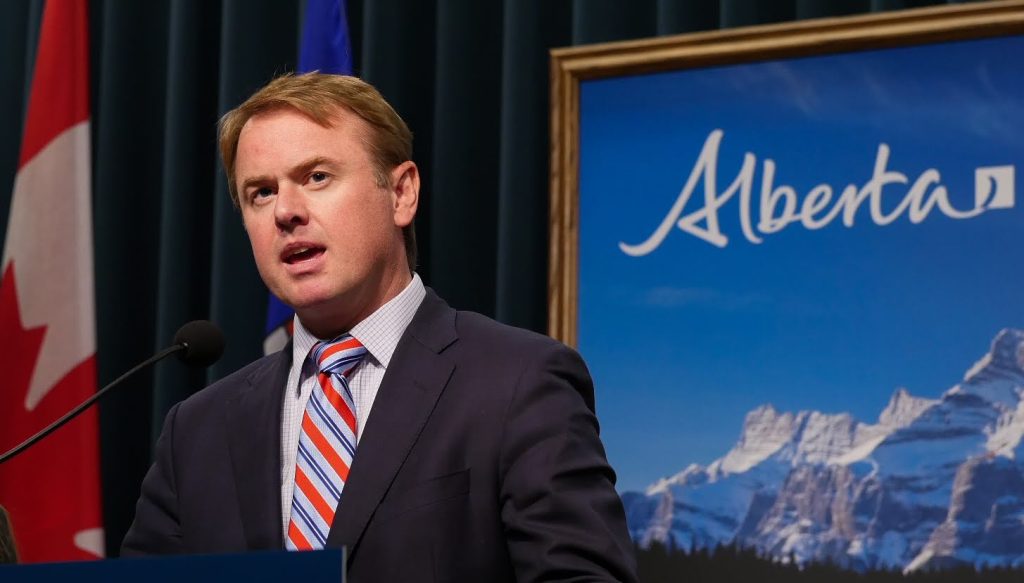
Posted August 16, 2022 6:21 pm.
Last Updated August 16, 2022 7:03 pm.
Alberta Minister of Justice and Solicitor General Tyler Shandro announced Tuesday that the provincial police force is the best option for the province to help rural communities and increase Indigenous protection, moving away from RCMP and federal subsidies.
The proposed model for the service would add 275 front-line officers to the smallest 42 municipalities in the province. The goal is to prioritize rural, remote, and Indigenous communities, according to the UCP.
Alberta’s proposed plan for a police force would support local policing with various special services, including investigative units, tactical, canine units, air support, and a mental health and addictions response.
Shandro says that the RCMP and the municipal police forces need help, and that something new is needed to bolster support in the province’s cities and towns most in need of police. He also says that the proposed model would give municipalities greater control and a voice in decisions regarding the police.
“One of the benefits of having a police service, one that has civilian oversight that falls under the police act or provincial legislation, is allowing civilians like us to have decisions about the deployment of resources and the budget of police services,” Shandro said.
“We do need to have modern police governance to be able to have a greater say in the deployment of resources, and our communities have a greater say over over recruitment strategies over budgeting. And that’s why I think Albertans are interested in having these discussions.”
According to the UCP, First Nations police services would continue to operate as normal, but the provincial police force would be able to provide support when they need it. The cost associated with the additional services would not impact municipal budgets, according to Shandro.
RELATED STORIES: ‘Keep our people safe’: Alberta First Nation wants to move ahead with police force
Twenty to thirty service hub detachments are being launched with 48 to 192 police officers, and would help larger municipalities. The proposed model will also include 65-85 community detachments that consist of a minimum number of ten police officers and a maximum of 80 officers working in them.
Local detachments will remain open with smaller detachments experiencing an increase to the number of their officers. However, Shandro was pressed about where the police officers would come from.
“We have no civilian oversight over the retention and recruitment of these officers. We could then be responsible for and have a say in how folks are recruited,” Shandro said.
There would be three urban hubs (southern, central, and northern) that would serve larger communities and their surrounding areas, and would function as the regional headquarters.
Under the proposed model, community detachments serving small municipalities and rural or remote areas, would be the backbone of an Alberta Police Service. Under the current model, there is no minimum number of front-line officers, with some detachments having as few as three officers.
Alberta Municipalities (ABmunis) were among a group of organizations that Shandro briefed on the proposal. ABmunis says they have not received enough consultation from local governments, the provincial government, and other stake holders since the Alberta Police Service report the UCP sent in Oct. 29, 2021.
There are 70 municipalities that have signed a letter asking the UCP to stop the plans to create this force; instead, asking for the resources to be put towards supporting RCMP officers and improving social services.
ABmunis has three principles that they wish for the UCP to address, and they are police governance and oversight, police service levels, and policing costs.
“We will be looking closely at the provincial government’s report to see if the deployment plan aligns with our provincial police service principles,” Scott Lundy with ABmunis said in a statement. “Fundamentally, we believe the creation of an Alberta provincial police service should be driven by the real public safety needs of the communities it will serve rather than by political motivations.”
Costs for the police force
The cost for the service hasn’t been revealed by the UCP, and still remains under wraps as Shandro is still calling this a proposition, with the cost still being decided.
NDP Justice critic Irfan Sabir said in a statement that the UCP police force proposal “is not a blueprint. It’s a boondoggle.”
“The UCP will spend hundreds of millions of dollars just to set up a new police force when what Albertans want is better policing focused on addressing crime and its root causes. That’s what I hear in Calgary, where Albertans are concerned about the rise in gun violence,” Sabir said.
RELATED STORIES:
-
Most Albertans do not want a provincial police force: Survey
-
UCP unveil plans for new provincial police force, NDP say cost to Albertans is major red flag
-
Calgary shooting-related violent crime faces upsurge
“Alberta Municipalities and the Rural Municipalities of Alberta have both passed resolutions against this plan. Rural leaders in more than 70 communities have sent the government a letter saying they don’t want this for their residents.”
Sabir also says that Jason Kenney and the UCP have been under investigation by the RCMP, and notes the timing of the police force with the investigation.
“Alberta can invest in better policing without blowing up the RCMP. Also, the UCP should not be able to dismantle the RCMP while under investigation by the RCMP,” Sabir said.
“No one is asking for this and the UCP needs to start listening.”
Shandro says the discussion on cost is a “red herring,” saying that the federal government has been trying to step away from their financial liability and subsidy that they provide the province. The federal subsidy is nearly $200 million, which covers the cost of having the RCMP in the province, 30 per cent of the expenses.
PricewatershouseCoopers LLC did a report at the request of the UCP to determine what the cost of transitioning to a provincial police force would be.
They predict that $366 million to $371 million is what it would cost the government, with six years to fully transition out. The contract the province has with the federal government expires in 2035.
“Alberta has guaranteed cost certainty for our municipalities here in the province. And we guarantee that we would bear any transition costs which are marginal in the context of a large provincial budget.”
RCMP and their role in Alberta
Shandro adds that the RCMP would still exist in each of their jurisdictions throughout the province, acting as the federal police force, but they would instead focus on their core mandate.
Those would be cyber terrorism, human trafficking, and organized crime, with Shandro saying they can focus on those “rather than being distracted by contract policing for the provincial police, and the 47 communities that they provide municipal police services for.”
“The biggest point that I’d really like to drive home for all Albertans is both Quebec and Ontario have their own Provincial Police Service, and their provinces have not collapsed,” Shandro said.
“Previous governments, I should say, have abdicated that responsibility by leaving community policing in the hands of the federal government, contracting it out to the federal government, taking back this provincial jurisdiction, and providing better and higher quality services, especially for rural Albertans who have been ravaged by crime,” Shandro said.
Curtis Zablocki, the commanding officer of the Alberta RCMP, said in a statement that the RCMP has always worked alongside the Alberta government. Saying, “Our budget and staffing levels are determined by the Government of Alberta, the provincial policing priorities are developed with their oversight and approval, and we report on strategic and budget performance measurements on a regular basis.”
“Open communication and consultations with community leaders; county and municipal governments; chiefs and councils; the Alberta Municipalities Association; the Rural Municipalities of Alberta Association; the Interim Police Advisory Board and Albertans have positioned the Alberta RCMP to continue responding and evolving as a police service. I am grateful for our continued ability to collaborate and work together to address the needs of communities and citizens,” Zablocki said.
He says that the RCMP are trained to the highest standard in the Canada, and that they are the leaders in the fields of forensics, police dog services, and emergency response. He adds they are strategically positioned throughout the province.
A new UCP leader and premier will be chosen this coming September, and it’s yet to be known whether that person will take the baton and advance this notion. Shandro says the frontrunners seem to be in support, but the opposition NDP are not.
